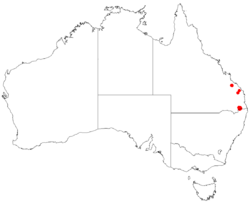Biology:Muellerina myrtifolia
| Muellerina myrtifolia | |
|---|---|
| Scientific classification | |
| Kingdom: | Plantae |
| Clade: | Tracheophytes |
| Clade: | Angiosperms |
| Clade: | Eudicots |
| Order: | Santalales |
| Family: | Loranthaceae |
| Genus: | Muellerina |
| Species: | M. myrtifolia
|
| Binomial name | |
| Muellerina myrtifolia | |

| |
| Occurrence data from AVH | |
| Synonyms[3] | |
|
Furcilla myrtifolia (A.Cunn. ex Benth.) Tiegh. | |
Muellerina myrtifolia, common name myrtle-leaved mistletoe,[4] is a hemiparasitic aerial shrub in the family Loranthaceae.[5] The species is endemic to New South Wales and Queensland.[5]
Description
M. myrtifolia is a rainforest mistletoe with small ovate, sessile leaves with a shiny upper surface and a dull lower surface, and measuring 15–20 mm long.[6] New growth is russet-coloured.[4] The inflorescence is a paired umbel which hangs from the foliage on long stalks, with each flower being a long red and yellow or red and white tube with dark, projecting stamens.[4][6] The oval shaped fruit are a dull green which ripens to a brownish-red, and have a prominent flower-scars.[4]
Ecology
The main hosts on which M. myrtifolia grows are vines, in particular, Wonga vine (Pandorea pandorana), Jasminum species, and Parsonsia species.[4] An inventory of host plants for Muellerina myrtifolia is given by Downey.[7][8]
Muellerina myrtifolia is not known to host any butterflies.[4]
Taxonomy
The species was first described by George Bentham in 1867 as Loranthus myrtifolius.[1][9] It was redescribed by B.A.Barlow in 1962 as Muellerina myrtifolia, with the current description of the species being that of Barlow in 1984.[1][10]
References
- ↑ 1.0 1.1 1.2 "APNI: Muellerina myrtifolia". Australian Plant Name Index. https://biodiversity.org.au/nsl/services/rest/name/apni/63905/api/apni-format. Retrieved 12 October 2018.
- ↑ Barlow, B.A. (1962) Studies in Australian Loranthaceae. I. Nomenclature and new additions. Proceedings of the Linnean Society of New South Wales 87(1): 55
- ↑ Govaerts, R. et al. (2018) Plants of the world online: Muellerina myrtifolia. Board of Trustees of the Royal Botanic Gardens, Kew. Retrieved 16 October 2018.
- ↑ 4.0 4.1 4.2 4.3 4.4 4.5 Watson, D.M. (2011) Mistletoes of Southern Australia, CSIRO Publishing, Collingwood, Victoria
- ↑ 5.0 5.1 Quirico, A.L.. "Muellerina myrtifolia". PlantNET - New South Wales Flora Online. Royal Botanic Gardens & Domain Trust, Sydney Australia. http://plantnet.rbgsyd.nsw.gov.au/cgi-bin/NSWfl.pl?page=nswfl&lvl=sp&name=Muellerina~myrtifolia. Retrieved 23 September 2018.
- ↑ 6.0 6.1 Moss, J.T. & Kendall, R. (2016) The Mistletoes of subtropical Queensland, New South Wales and Victoria. Butterfly and Other Invertebrates Club Inc. Runcorn Queensland.
- ↑ Downey, P.O. (1998) An inventory of host species for each aerial mistletoe species (Loranthaceae and Viscaceae) in Australia. (Cunninghamia 5(3) 685-720)
- ↑ Downey, P.O. (2004) A regional examination of the mistletoe host species inventory. (Cunninghamia 8(3) 354-361)
- ↑ Bentham, G. (1867), Orders XLVIII. Myrtaceae- LXII. Compositae. Flora Australiensis 3: 390
- ↑ Barlow, B.A. in George, A.S. (ed.) (1984), Loranthaceae. Flora of Australia 22: 88, 90, Map 101
External links
- PlantNet:Description of Muellerina myrtifolia (Quirico, A.L. 1992. Flora of NSW 3)
- AVH: Occurrence data for Muellerina myrtifolia
Wikidata ☰ Q18074185 entry
 |

